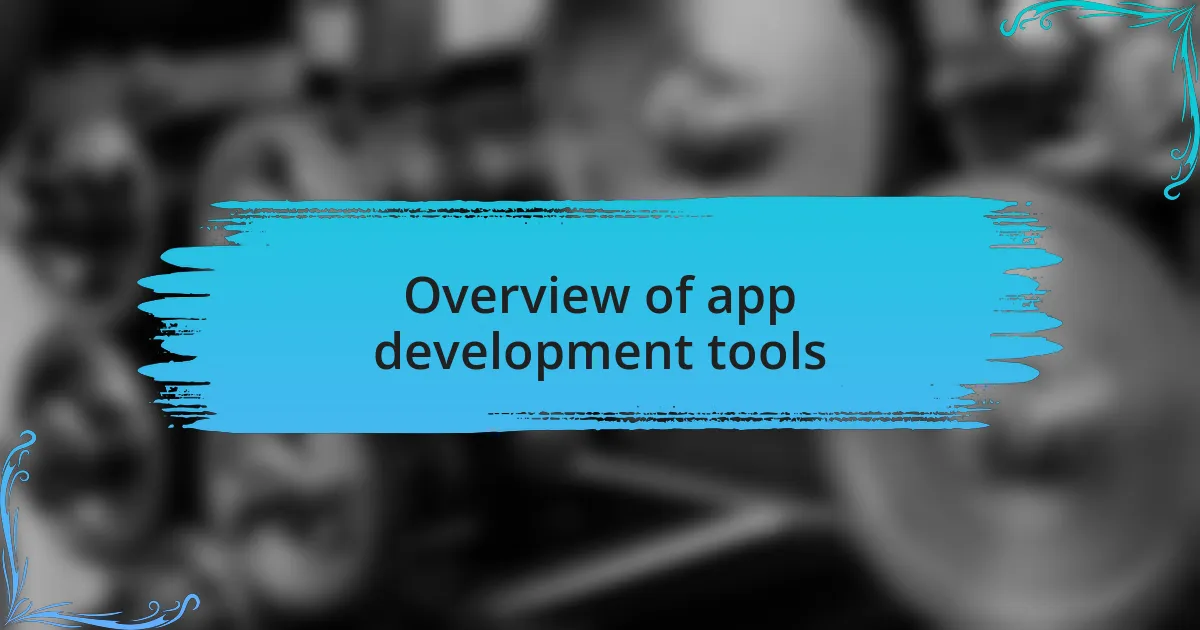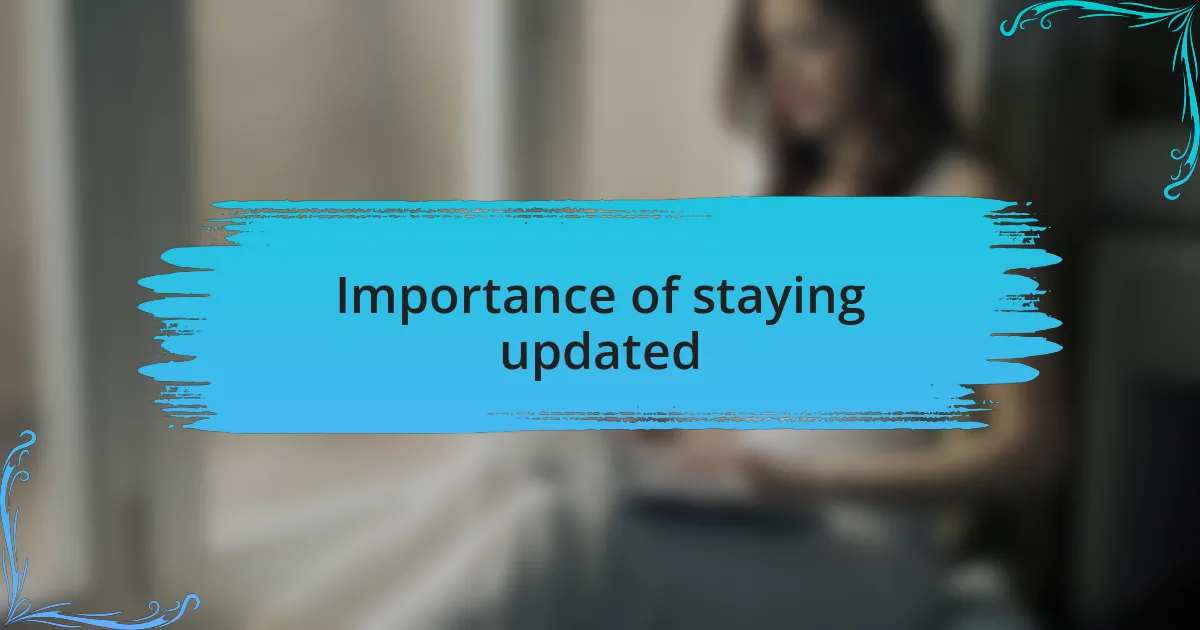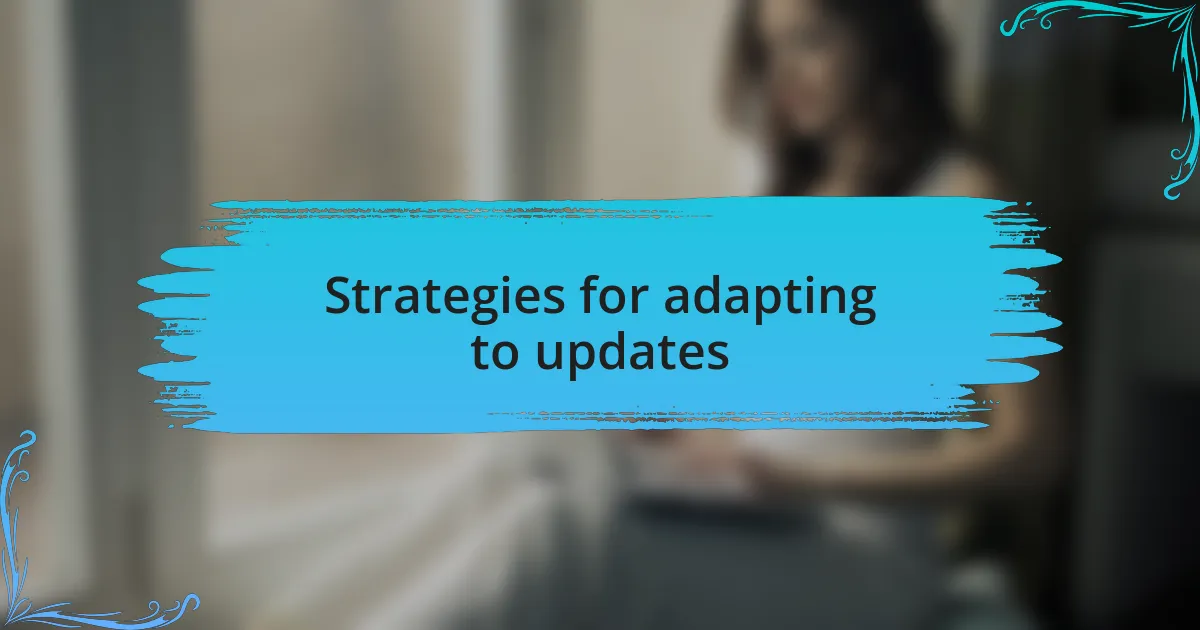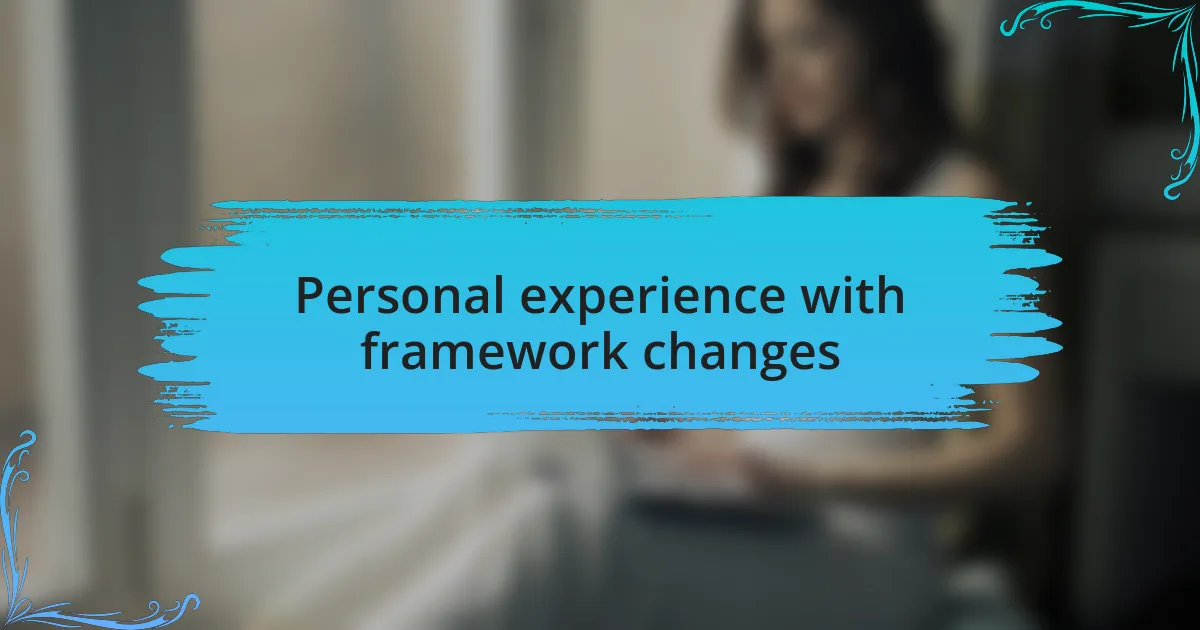Key takeaways:
- Choosing the right app development tools, like React Native, can significantly enhance productivity and creativity in projects.
- Staying updated on tools and frameworks is essential for maintaining competitive advantage and fostering community engagement.
- Adaptation to new updates can be challenging, necessitating robust backup strategies and the importance of community support.
- Proactive approaches, such as incremental updates and detailed impact assessments, help manage the challenges of framework changes effectively.

Overview of app development tools
When I first delved into the world of app development, I quickly realized that choosing the right tools was like picking the perfect tools for a craftsman – it shapes the entire project. App development tools range from integrated development environments (IDEs) to frameworks and libraries, each serving a unique purpose. Honestly, I remember feeling overwhelmed by the sheer number of options available; it made me ask myself, which ones truly enhance productivity and spark creativity?
There’s something truly empowering about using the right app development tool. For instance, after trying out several frameworks, I discovered that React Native allowed me to create cross-platform apps more efficiently, and that realization was a game-changer. It made me wonder how much time I could have saved if I had found it earlier in my journey.
As I navigated through various platforms, I often encountered the question: do I prioritize performance, scalability, or ease of use? This crossroads is familiar to many developers, and I’ve learned that while each project may require a different focus, having a solid understanding of these tools allows for greater flexibility and innovation in my work. The excitement of trying something new always kept me on my toes, eager to integrate the latest tech into my projects.

Importance of staying updated
Staying updated in the world of app development isn’t just beneficial; it’s essential. I still recall grappling with a major update in a framework I frequently used. Initially, I hesitated to dive in, fearing the learning curve. However, once I embraced the changes, I realized the new features drastically improved my workflow and overall project outcomes. This serves as a reminder: adaptation can lead to enhanced creativity and efficiency.
The tech landscape shifts rapidly, and those who resist change often find themselves outpaced. I learned this lesson the hard way when I chose to stick with an outdated library for a project. As developers moved forward, the lack of community support became painfully evident. It was a tough realization, but it highlighted the importance of staying connected to the evolving toolset. How many times have you felt the frustration of using a tool that just doesn’t keep up?
Moreover, engaging with new updates fosters a sense of community. I remember participating in a forum discussion where developers shared tips about the latest features in a popular framework. The insights I gained not only enhanced my understanding but also connected me with others who shared my struggles and triumphs. That exchange of knowledge reinforced my belief that staying updated is not solely about individual growth; it’s about being part of a vibrant, dynamic ecosystem.

Challenges faced during updates
Adapting to new framework updates can be quite challenging, especially when existing codebases need to be modified. I vividly remember a project where an update introduced significant breaking changes, causing my application to malfunction overnight. It was an unsettling experience, and I found myself questioning my capabilities. How do you deal with moments when everything seems to fall apart just because of an update?
Testing becomes an intricate dance, too. I often allocate time to run regression tests after an update, only to discover unexpected issues that require urgent fixes. In one instance, a seemingly harmless update led to misalignments in the user interface, impacting user experience. Isn’t it frustrating when you’re so close to a deadline only to face unforeseen complications?
Then there’s the emotional toll of learning curves associated with updates. The excitement of exploring new features can quickly turn to anxiety, especially when documentation is sparse or unclear. I still recall feeling overwhelmed while trying to understand a newly introduced API, questioning whether I should have updated at all. Have you ever felt stuck in a labyrinth of information, wondering which direction to take?

Strategies for adapting to updates
When it comes to adapting to new framework updates, I find that creating a robust backup strategy is essential. There was an instance when I implemented an update without saving a complete state of my project, which led to a significant setback. Now, I always ensure that I have a reliable backup in place; it gives me peace of mind and a safety net if things go awry. Have you ever wished you could rewind the clock just a bit?
Another strategy I prioritize is staying engaged with the developer community. I often turn to forums or user groups where updates are discussed in detail. One notable moment was when I encountered a bug after a major update. I was so relieved to find others sharing similar experiences and solutions. I wonder, how often do we overlook the vast resources others can provide in these situations?
Lastly, I believe in the power of incremental updates. Rather than jumping headfirst into the latest version, I take small steps to integrate features gradually. In my experience, this method lessens the impact of potential issues. There was a time when I hesitated during a major update and opted to implement features piece by piece – it not only simplified the process but also allowed me to adapt more comfortably. Have you tried this approach in your projects?

Personal experience with framework changes
Navigating framework changes can be quite a rollercoaster. I remember a specific instance where an update introduced some major changes to the API I was using. Initially, I felt overwhelmed and anxious, thinking about how these changes would affect my ongoing projects. But then I approached it with curiosity, dissecting the new documentation and exploring the benefits that came with the changes. Have you ever found yourself in a similar situation, where initial frustration gave way to unexpected opportunities?
There was another time when I was left scrambling after a framework update that altered the way components communicated with each other. I had to prioritize reworking my code quickly to meet deadlines. It was a stressful experience, but I learned the importance of flexibility. I began to appreciate the iterative process, viewing each update as a chance to refine and enhance my skills. Isn’t it fascinating how challenging moments can drive growth?
Reflecting on these experiences, I can see the value in being proactive rather than reactive when it comes to framework updates. I now take the time to create a detailed impact assessment before implementing new changes. By considering how each update integrates into the larger project, I can align my strategy accordingly. Do you find that taking a step back and evaluating the bigger picture helps in your development process?